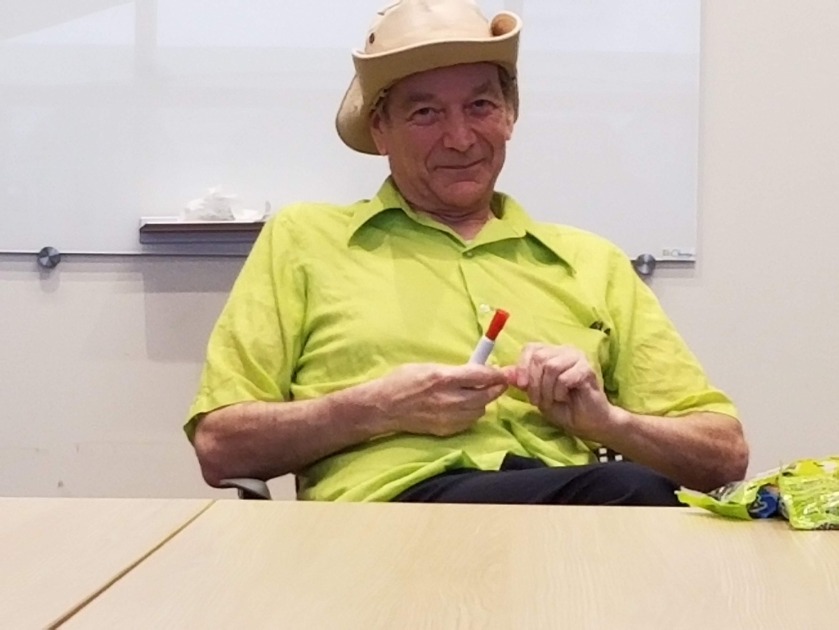Our [July/August issue, on sale now!] features Terry Franklin’s “Isabella Chaos,” his second story published in Analog. Learn more about Franklin in our Q&A with the author himself, and discover how a camping trip helped inspire his latest tale.
Analog Editor: What is the story behind this piece?
Terry Franklin: Things can take a long time on the dirt roads in the mountains of Vermont. One morning, I had a couple of hours of waiting to do before the arrival of some friends for a camping trip. While I stood around in the forest with nothing better to do, I decided to make up a story based on whatever I had seen that day. I had seen caterpillars, llamas, and a hobo camp. . . .
AE: Many of our Analog authors are interested in science. Do you have any scientific background, and does it impact your fiction?
TF: My degree is actually in Biology. I studied the taxonomy, evolution, and ecology of higher plants. But I try to keep up my knowledge in all sciences (or at least in the “hard” ones). Due to my love of science fiction, I watch space science in particular. At science fiction conventions, I always hit the panels on space probes, plans for settling Mars, etc. One advantage of living in a town with a large university, is that I have access to colloquia by visiting scientists at the cutting edge of their fields. I recently went to hear a talk on periodic fast radio bursts at the UMass Astronomy Dept. by Dr. Dongzi Li from Princeton. Actually that shouldn’t be a plural—there have been many fast radio bursts, a few of them have repeated, but only one (which she discovered) repeats with a regular period. I left the talk thinking that’s really cool . . . I ought to go to Wikipedia and read more on the subject. Then I realized I’d have to wait till new discoveries come out in the literature in the future—I already knew everything that is currently known.
AE: How much or little do current events impact your writing?
TF: I am a voracious consumer of current events—scientific, cultural, and political. In the past I have worked as a journalist. I do a good bit of extrapolating trends into the future. I guess I’m like Robert Heinlein in that respect.
One morning, I had a couple of hours of waiting to do before the arrival of some friends for a camping trip. While I stood around in the forest with nothing better to do, I decided to make up a story based on whatever I had seen that day. I had seen caterpillars, llamas, and a hobo camp. . . .
AE: Are there any themes that you find yourself returning to throughout your writing? If yes, what and why?
TF: Probably more than anything else, it’s conflict between societies (human or alien), and also within societies, as when one group oppresses another. I don’t write “military sf.” Most of my work concerns how to avoid the conflict, or how to recover afterward. Every year or so, at the UMass Physics Department, some octogenarian physicist from MIT shows up and gives a talk, thundering like an Old Testament prophet, along the lines of: Teach your students about nuclear weapons—they haven’t gone anywhere—they are still here! In addition to my writing, I do a good deal of speaking to current college students [see photo above]. It is amazing how clueless people are these days about topics that were common knowledge to everyone during the “Cold War”— everything from deterrence strategy, to which fallout isotopes bio-accumulate the most when going up the food chain.
AE: Which other projects are you currently working on?
TF: Since finally finishing my novel, I have gone back to short stories. Mostly science fiction, of course! But I have to admit I’ve been dipping my toe in “mainstream literature.”
AE: What are you reading right now?
TF: I’ve been delving into Chinese science fiction quite a bit. Also reading more fantasy than I used to. Plenty of history, political science, and other non-fiction.
AE: What is the weirdest research rabbit-hole that working on a story has led you down?
TF: This answer may not count . . . in that I’d already done the research, written the story, and had it accepted by Analog, before the excitement began. But my “Sunward Planet” story (May/June ’21 edition) about life on Venus came out right in the middle of the news media frenzy of the purported discovery of life on Venus. I got to meet a number of the scientists involved in that now-disputed discovery.
AE: Who or what are your greatest influences and inspirations?
TF: Clarke, Heinlein, Azimov, and all the other “Golden Age” masters. Leo Tolstoy, and the other Nineteenth Century Russians. Rudyard Kipling. Mark Twain. Huxley. Vonnegut. Tolkien. Dozens of others I can’t think of at the moment!

